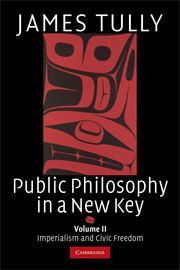Book contents
- Frontmatter
- Contents
- Acknowledgments
- Credits
- INTRODUCTION
- PART 1 GLOBAL GOVERNANCE AND PRACTICES OF FREEDOM
- PART 2 ON IMPERIALISM
- 5 On law, democracy and imperialism
- 6 Communication and imperialism
- 7 The imperial roles of modern constitutional democracy
- CONCLUSION: CIVIC FREEDOM CONTRA IMPERIALISM
- Bibliography
- Index to Volume II
5 - On law, democracy and imperialism
Published online by Cambridge University Press: 05 September 2012
- Frontmatter
- Contents
- Acknowledgments
- Credits
- INTRODUCTION
- PART 1 GLOBAL GOVERNANCE AND PRACTICES OF FREEDOM
- PART 2 ON IMPERIALISM
- 5 On law, democracy and imperialism
- 6 Communication and imperialism
- 7 The imperial roles of modern constitutional democracy
- CONCLUSION: CIVIC FREEDOM CONTRA IMPERIALISM
- Bibliography
- Index to Volume II
Summary
INTRODUCTION: THE FIELD OF POLITICAL THEORY AND PUBLIC LAW
In the course of my research on globalisation and freedom in Part 1, I came to see that the languages in which the global order was disclosed, studied and criticised were useful and necessary, yet ultimately limited and inadequate to expose fully the deep-seated global relationships of oppression – of inequality, dependency, domination, exploitation and environmental damage. I gradually realised that many of the global relationships that govern the conduct of people and peoples are imperial relationships. These oppressive relationships were built up during the age of formal Western imperialism and they have survived decolonisation and intensified in the current period. I thus had to shift my focus to the imperial dimensions of the present global order. In this chapter I investigate how our dominant languages of disclosure and research conceal and overlook the imperialism of the present, each in different ways, and in so doing gradually bring the contemporary mode of imperialism (informal imperialism) into view as an object of critique in theory and transformation in practice.
Since formal decolonisation in the middle of the twentieth century most theories of public law and political formations begin from the presupposition that the field of law and politics is one of sovereign, constitutional states bound together by public international law. Yet, over the last fifteen years, this widely shared presupposition has been challenged as simply one way of characterising the field of constitutional law and political association among others, and the broader issue of how to characterise the field of law and politics has become a central question to which rival answers have been presented and debated.
- Type
- Chapter
- Information
- Public Philosophy in a New Key , pp. 127 - 165Publisher: Cambridge University PressPrint publication year: 2008
- 3
- Cited by

